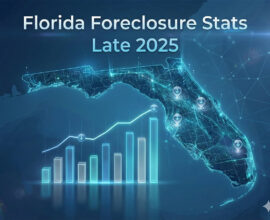How to Deal with Tenants in Your Foreclosure and Tax Deed Purchases
When you become the successful bidder at a Florida foreclosure auction (via a tax deed, mortgage, association, or county lien, etc.), you may find that the place you bought is not vacant.
This does not mean that you get to force your way in, take all their things out, and change the locks.
Your rights to possess your purchased property depend on the kind of foreclosure and the type of occupant on the property. Approaching possession of your foreclosure purchase the wrong way can put you in legal peril or make you waste thousands of dollars filing the wrong things in court.
Because a lot of false information exists out there (like articles telling you that 30-day notices suffice), this article will empower you and your real estate business by going approaching this issue the right way. Let’s break it down into simple-to-follow steps for you to take when the property you buy comes inhabited.
- Determine How You Acquired the Title.
- If you bought the property at a tax deed foreclosure, you are entitled to immediate possession no matter who the occupant is (former tenant, former owner, former owner’s family, or squatter, etc.). However, this does not mean that you get to force your way in, take all their things out, and change the locks. Instead, you must file a special lawsuit if the occupant does not leave after you introduce yourself as the new owner.
- If you purchased at a mortgage, lien, or association foreclosure, you may be able to solicit a writ of possession from the same foreclosure court (so long as the court retained jurisdiction to grant writs in the final judgment of foreclosure). If the court did not retain that jurisdiction, you would have to file a separate lawsuit. Unlike property acquired at a tax deed sale, you are entitled to immediate possession only when the occupant is the former owner, their family, or a squatter.
If you introduce yourself to the occupant before you have the certificate of title, you may be inviting objections and other “delay” pleadings from the occupants.
- Contact the Occupant and Ask for Proof of Tenancy.
- While you do not need to determine the type of occupant if you purchased the property at a tax deed sale, you do need to do so for mortgage, lien, or association foreclosure purchases.
- The timing must be right. Do not contact an occupant until you are the official owner in title. In Florida foreclosure sales, after you win a bid, you are given a certificate of sale and then must wait at least 10 days (the objection period) before you get your certificate of title. Until you have your certificate of title, you are not the owner and cannot demand possession of the property. Plus, if you introduce yourself to the occupant before you have the certificate of title, you may be inviting objections and other “delay” pleadings from the occupants.
- Once you have the certificate of title, introduce yourself (or have the agent you send to the property introduce your company as the owner) and ask them for their name and whether they are a tenant. If they say they are a tenant, then:
- Ask for a copy of their lease.
- If there is no written lease, ask what their monthly rent amount is and for proof of the last payment made.
Because foreclosures can take years to litigate, often that person is not a bona fide tenant and will have no lease to show you, no proof of payment, and only a vague claim that they pay a very low sum of rent to the former owner. This is important because only bona fide tenants are entitled to possess the property after you purchase it.
You must post the notice as soon as you have the title.
- Post the Right Notices.
- Now that you know who occupies the property, you can take the steps to provide the correct notices. Remember, if the property was purchased at a tax deed sale, you do not need to give notices, every occupant must vacate.
- Florida has a Protecting Tenant at Foreclosure Act statute that, as a result of the COVID-19 pandemic, was changed to match the Federal Protecting Tenant at Foreclosure Act. Prior to COVID-19, tenants were entitled to 30-day notices of termination of tenancy (when they had oral leases). Now, they are entitled to a 90-day notice of termination of tenancy. These notices must state the name of the new title holder, the case number of the foreclosure case, the amount of rent, and that the rent must be paid to the purchaser. These notices must be posted in a conspicuous place on the property. You should also inform the tenant in the notice of when payment is due.
- You need to understand that if a tenant has a valid written lease, that the term on the written lease has more than 90 days left on it, and that you do not intend the property to become your homestead, then the notice must state that the tenancy ends when the written lease term ends.
- Finally, the 90 days begins when you post the notice. Not from when the foreclosure sale takes place. Not from when you receive your certificate of title. So, you must post the notice as soon as you have the title.
- File for Possession in Court.
- You may be thinking: “I have to wait at least 90 days to get possession every time?” The answer is no.
- If the occupant is not a tenant, and you purchased at a foreclosure action, you can petition the court to issue a writ of possession as soon as you get your certificate of title.
- If the occupant is a tenant, you purchased at a foreclosure action, and they do not pay the rent on the notice, then you can petition the court to issue a writ of possession within a week or so of the rent payment being due. You do not have to wait for the 90 days to expire because a person who refuses to pay rent is not a bona fide tenant under the statute.
- What about tax deed purchases? Because tax deed foreclosures are administrative foreclosures, there is no lawsuit open and ready for you to petition for a writ. As such, these do require filing a separate lawsuit for possession.
Don’t let occupants intimidate you, fellow investors mislead you, or even clerks misadvise you.
- Avoid Common Mistakes.
- One mistake I see too often is that the purchaser at a foreclosure case thinks that because the person is a tenant, they must file an eviction lawsuit and post a three-day notice, etc. The occupant is not your tenant. Do not create legal obligations for yourself that a true landlord has.
- Do not file an eviction lawsuit if you bought the property at a tax deed sale. No matter who the occupant claims to be, you are not their landlord. Tax deeds are brand-new titles from the state. It creates a clean slate as far as possession goes.
- Do not file an ejectment lawsuit if you bought the property at a tax deed sale. No matter who the occupant claims to be, ejectments are for when there are competing title interests or claims of superior rights to possession. An ejectment suit just invites legal challenges to your tax deed.
- You cannot file non-eviction lawsuits or petitions on behalf of your LLC, trust, or corporation if you are not a licensed Florida attorney. Doing that is called the unauthorized practice of law, and the judge cannot consider motions, petitions, or complaints filed by non-lawyers, even if you own the LLC, trust, or corporation.
- Finally, if you are buying property from the person or entity who was actually the winning bidder at a mortgage, lien, or association foreclosure, you will not have standing (the legal right to seek relief in court) to ask for a writ of possession in the foreclosure case. Thus, always make sure that the purchaser at the foreclosure is selling you a confirmed vacated property.
Don’t let occupants intimidate you, fellow investors mislead you, or even clerks misadvise you. You now know how to avoid legal peril and how to not waste thousands of dollars filing the wrong things in court to gain possession of your foreclosure purchases. And if you need help, contact an experienced real estate possession attorney to help you do it the right way.








